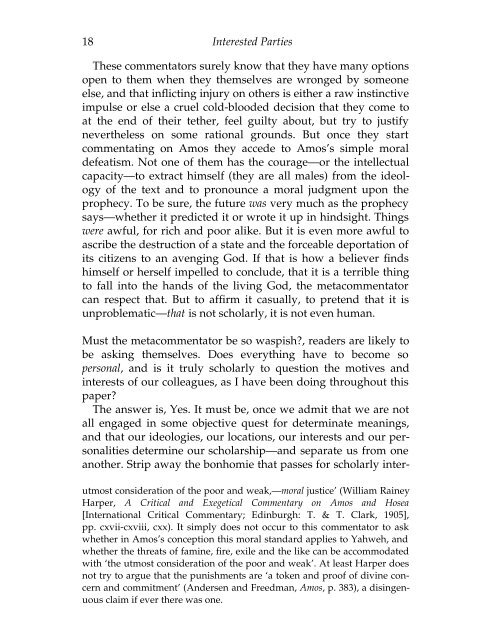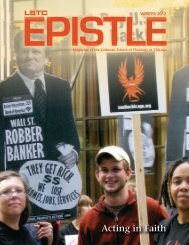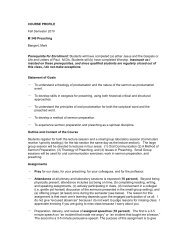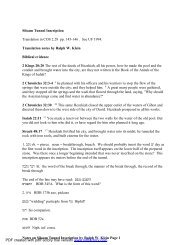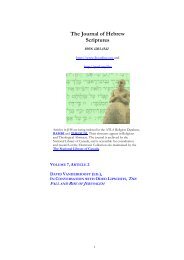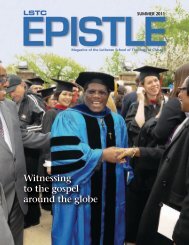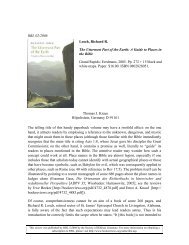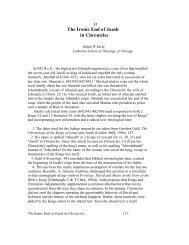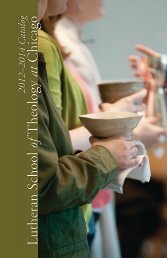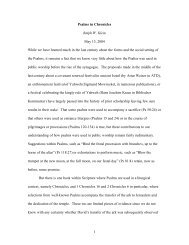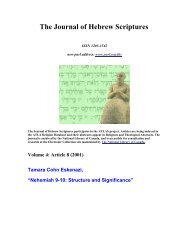Metacommentating Amos* Metacommentary, what is that ... - Fontes
Metacommentating Amos* Metacommentary, what is that ... - Fontes
Metacommentating Amos* Metacommentary, what is that ... - Fontes
Create successful ePaper yourself
Turn your PDF publications into a flip-book with our unique Google optimized e-Paper software.
18 Interested PartiesThese commentators surely know <strong>that</strong> they have many optionsopen to them when they themselves are wronged by someoneelse, and <strong>that</strong> inflicting injury on others <strong>is</strong> either a raw instinctiveimpulse or else a cruel cold-blooded dec<strong>is</strong>ion <strong>that</strong> they come toat the end of their tether, feel guilty about, but try to justifynevertheless on some rational grounds. But once they startcommentating on Amos they accede to Amos’s simple moraldefeat<strong>is</strong>m. Not one of them has the courage—or the intellectualcapacity—to extract himself (they are all males) from the ideologyof the text and to pronounce a moral judgment upon theprophecy. To be sure, the future was very much as the prophecysays—whether it predicted it or wrote it up in hindsight. Thingswere awful, for rich and poor alike. But it <strong>is</strong> even more awful toascribe the destruction of a state and the forceable deportation ofits citizens to an avenging God. If <strong>that</strong> <strong>is</strong> how a believer findshimself or herself impelled to conclude, <strong>that</strong> it <strong>is</strong> a terrible thingto fall into the hands of the living God, the metacommentatorcan respect <strong>that</strong>. But to affirm it casually, to pretend <strong>that</strong> it <strong>is</strong>unproblematic—<strong>that</strong> <strong>is</strong> not scholarly, it <strong>is</strong> not even human.Must the metacommentator be so wasp<strong>is</strong>h?, readers are likely tobe asking themselves. Does everything have to become sopersonal, and <strong>is</strong> it truly scholarly to question the motives andinterests of our colleagues, as I have been doing throughout th<strong>is</strong>paper?The answer <strong>is</strong>, Yes. It must be, once we admit <strong>that</strong> we are notall engaged in some objective quest for determinate meanings,and <strong>that</strong> our ideologies, our locations, our interests and our personalitiesdetermine our scholarship—and separate us from oneanother. Strip away the bonhomie <strong>that</strong> passes for scholarly interutmostconsideration of the poor and weak,—moral justice’ (William RaineyHarper, A Critical and Exegetical Commentary on Amos and Hosea[International Critical Commentary; Edinburgh: T. & T. Clark, 1905],pp. cxvii-cxviii, cxx). It simply does not occur to th<strong>is</strong> commentator to askwhether in Amos’s conception th<strong>is</strong> moral standard applies to Yahweh, andwhether the threats of famine, fire, exile and the like can be accommodatedwith ‘the utmost consideration of the poor and weak’. At least Harper doesnot try to argue <strong>that</strong> the pun<strong>is</strong>hments are ‘a token and proof of divine concernand commitment’ (Andersen and Freedman, Amos, p. 383), a d<strong>is</strong>ingenuousclaim if ever there was one.


